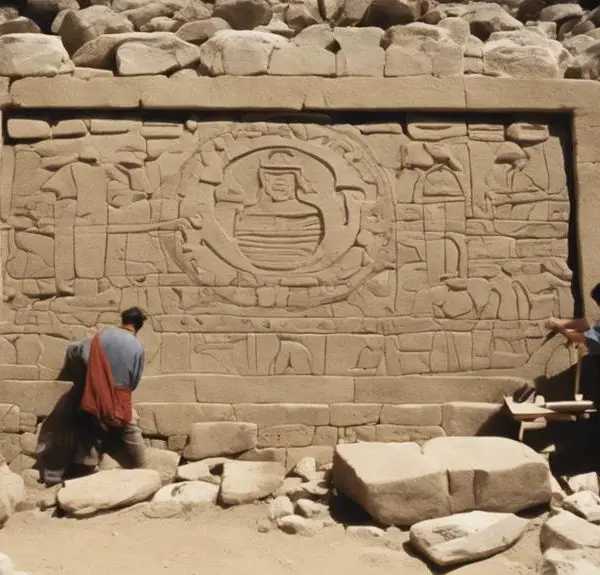Yearning to comprehend the unexpected meaning of 'terrible' in the Bible? Dive into its historical and theological nuances for a riveting revelation.

Terrible Meaning in the Bible
The Bible, like an intricate tapestry, weaves in words that often carry more weight than what meets the eye. 'Terrible' is one such term, its meaning in the holy scriptures might surprise you.
Now, you might associate 'terrible' with something negative or disastrous, but what if its biblical usage paints a different picture altogether? By probing its historical interpretations, biblical contexts, theological implications, and modern understandings, you're about to embark on a fascinating journey of discovery.
So brace yourself, because what you uncover might just challenge everything you thought you knew.
Key Takeaways
- 'Terrible' in the Bible signifies awe-inspiring, formidable aspects of God's power and grandeur.
- Historical interpretations of 'terrible' evolved from divine wrath to awe-inspiring divine power.
- Verses in Exodus, Deuteronomy, and Job illustrate different contexts of 'terrible' in Biblical texts.
- The modern negative connotation of 'terrible' differs from its original biblical meaning of reverence and awe.
Biblical Context of 'Terrible

While you may associate the word 'terrible' with a negative connotation in modern language, it holds a different, more complex meaning in the biblical context. It's crucial to understand the 'terrible' symbolism and biblical language nuances to fully grasp its significance.
In the Bible, 'terrible' often symbolizes something awe-inspiring, extraordinary, or formidable, rather than something strictly negative. It was used to express reverence and fear due to the overwhelming power or grandeur of God. For instance, God's deeds were described as 'terrible' not because they were evil, but due to their enormity and impact, which were beyond human comprehension.
This semantic shift is due to differences in language and cultural contexts between the biblical era and today. The original Hebrew and Greek texts utilize words that contain subtleties lost in translation. It's also influenced by the evolution of language over centuries, where words change their meanings and connotations.
Therefore, understanding the biblical context of 'terrible' requires a deeper look into the language nuances and cultural significance during the biblical era. By doing so, you're not just reading the Bible; you're unraveling its intricate linguistic tapestry.
Historical Interpretations

Building on the linguistic and cultural underpinnings of 'terrible' in the Bible, let's now turn our attention to how these interpretations have evolved historically. Cultural influences and interpretive discrepancies have played significant roles in shaping our understanding of this term.
To clarify, consider the table below, which compares two historical periods:
Historical Period |
'Terrible' Interpretations |
|---|---|
Medieval Times |
'Terrible' was often associated with divine wrath and punishment |
Enlightenment Era |
Interpretations shifted toward a more metaphorical understanding, seeing 'terrible' as representing awe-inspiring divine power |
These differences highlight the fluidity of biblical interpretations across time and cultures. During the Medieval Times, the emphasis was more on the fear-inducing aspects of 'terrible', correlating with a society that heavily focused on divine punishment. The Enlightenment Era, on the other hand, saw a shift towards a metaphorical understanding, influenced by a cultural push for rationality and metaphorical interpretation of religious texts.
Hence, the way 'terrible' is understood isn't static but evolves with cultural shifts and interpretive shifts. As we navigate the historical interpretations of 'terrible', we're reminded of the complexity and richness of biblical language.
Terrible' in Different Verses

Delving into specific biblical verses, you can observe a myriad of ways the term 'terrible' is used and understood, each providing unique insights into its contextual and historical meanings. This exploration, coupled with understanding Terrible's etymology, helps to better comprehend its Biblical decoding.
Looking at Exodus 34:10, for instance, 'terrible' is used to depict God's mighty works, lending it a sense of awe and reverence. In Deuteronomy 7:21, on the other hand, 'terrible' conveys a sense of fear in reference to God's might. Here, 'terrible' aligns more with its synonyms like 'fearful' or 'formidable', indicating a threatening or daunting aspect.
In the book of Job (37:22), 'terrible' is used to depict the majesty of God, wherein it implies respect and admiration, rather than fear. These various contexts highlight the multifaceted nature of the term 'terrible' within the Bible, and how its meaning can shift significantly in different verses. By studying Terrible's synonyms and its etymology, you're able to gain a broader understanding of its application and interpretation within Biblical texts.
Theological Implications of 'Terrible

Taking into account these varying interpretations of 'terrible' within the Bible, you're now in a position to grapple with the potential theological implications of this term. Consider first 'Terrible's Linguistic Evolution'. Over centuries, 'terrible' has transitioned from invoking awe and reverence to signifying something dreadful. This linguistic shift may have altered the way we comprehend the divine fearfulness as portrayed in the Bible. Consequently, it challenges our understanding of God's nature.
The term 'terrible', when associated with God, often communicates his formidable power and absolute authority. It's a reminder that God, in his divine fearfulness, is beyond human comprehension. Thus, the term 'terrible' underscores the necessity of respecting and acknowledging God's supreme authority and unparalleled power, not because He's horrible, but due to his immense power and ultimate sovereignty.
Modern Understanding of 'Terrible

In today's society, you may notice an overwhelmingly negative connotation associated with the term 'terrible', a stark contrast to its historic, biblical usage. The cultural interpretations have morphed over time, steering the meaning towards something predominantly negative. 'Terrible' is often used to describe situations, events, or things that cause fear, dread, or are simply undesirable.
Delving into 'terrible's' etymology reveals its Latin origin, ‘terribilis', denoting something causing terror. However, in biblical times, it was used to show reverence, awe, or majesty. Across cultures, the interpretation of this term has varied, but the modern, Western understanding aligns more with its etymological roots, focusing on fear or dread.
The change in connotation could be attributed to cultural shifts, societal development, and language evolution. You might notice this trend in other words too, as their usage changes over time to mirror societal changes. Understanding the historical context of words like 'terrible' can provide insight into cultural shifts, and how language can be a reflection of societal attitudes and norms. Therefore, 'terrible' isn't just a word; it's a cultural artifact, tracing the evolution of human language and society.
Frequently Asked Questions
What Kind of Mental or Emotional Impact Did the Term 'Terrible' Have on Individuals in Biblical Times?"
In biblical times, the term 'terrible' could've sparked fear and awe in individuals. It's likely they associated the word with divine power and judgment. Symbolism was important, and 'terrible' may have represented God's wrath or strength.
But remember, biblical language has evolved, so our modern understanding may differ. It's vital to consider this evolution when analyzing the emotional impact of such terms in historical contexts.
Are There Any Cultural or Societal Factors That Influenced the Usage of the Term 'Terrible' in the Bible?"
Yes, there're cultural and societal factors that influenced the use of 'terrible' in biblical texts.
You'll find that 'terrible' symbolism and the evolution of biblical language played a role.
Societal fears and cultural practices often shape language, thus, 'terrible' may have been used to reflect societal anxieties of the time.
Moreover, as language evolved, the term 'terrible' could have taken on new nuances, further influencing its usage.
How Have Different Religious Denominations Interpreted the Term 'Terrible' in the Bible?"
You'll find that different religious denominations interpret the term 'terrible' in the Bible based on their theological perspectives. Often, 'terrible' symbolism relates to God's awe-inspiring power or judgement.
However, interpretations can vary due to the evolution of biblical language over centuries. It's crucial to understand the original Hebrew or Greek meaning to fully grasp its context.
Scholars continue to debate the complexity of this term in religious texts.
Can the Term 'Terrible' in the Bible Be Connected With Any Specific Biblical Characters or Events?"
Yes, you can connect 'terrible' in biblical language to specific characters or events. For example, God's power is often described as 'terrible' in the Old Testament. This reflects the 'terrible' symbolism of awe-inspiring might and fear.
Over time, the evolution of biblical language has seen 'terrible' shift in connotation, complicating its interpretation. Understanding this term's historical usage can deepen your analysis of biblical texts.
Is There a Relationship Between the Biblical Interpretations of 'Terrible' and Its Meaning in Other Religious Texts?"
You're examining if 'terrible' symbolism in various religious texts correlates with its biblical interpretation, particularly as divine fear. It's crucial to contextualize 'terrible' within each religion's unique doctrines and philosophies.
You'll often find it symbolizes awe-inspiring power or fear of the divine, yet its exact connotations can vary.
A detailed analysis of each text is necessary to fully understand the nuances of 'terrible' in different religious contexts.
Conclusion
In wrapping up, the biblical interpretation of 'terrible' is far from our modern perception. It's a reflection of God's awe-inspiring power, not an implication of evil or wrongness.
The term, taken in context, speaks volumes about the historic and theological perspectives of biblical times. Understanding this not only enriches your biblical comprehension, but also transforms how you perceive 'terrible' today, proving the Bible's profound influence on language and perception.



Sign up